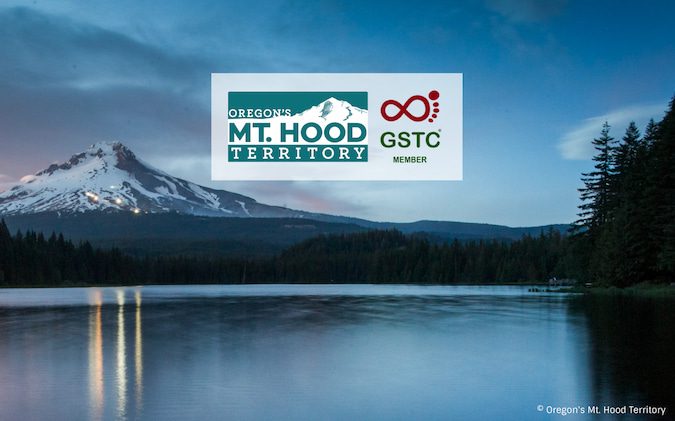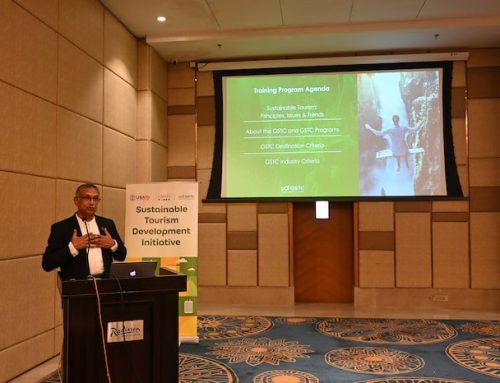Oregon’s Mt. Hood Territory in Clackamas County has joined as a Member of the Global Sustainable Tourism Council (GSTC)
Oregon’s Mt. Hood Territory, the Destination Organization (DMO) for Clackamas County, is located southeast of Portland. This region starts at the eternally snowy peak of Mt. Hood, spills into the farms and vineyards of the Willamette Valley where rolling hills are steeped with heritage and runs along the mountain-fed rivers meandering toward the Portland metro area.
Mt. Hood Territory is responsible for developing and promoting tourism for the County.
Sustainability in Clackamas County
Mt. Hood Territory aims to develop, support and enhance tourism assets to incorporate principles of sustainable tourism through the integration of products and partners that sustain, reinforce, or enhance the unique character of the region. Their work is viewed and evaluated through three lenses:
- Diversity, Equity, and Inclusion
- Impact to visitors, residents, partners and place
- Sustainability
This is done through several actions:
- Practice sustainable tourism strategies that improve the quality of life and economy for the citizens of Clackamas County, celebrate the culture and heritage of the region, and protect their natural assets for current and future generations.
- Drive visitors to identified areas as informed by the unique needs of individual tourism assets to optimize positive impacts and mitigate negative impacts.
- Monitor resident sentiment on tourism in the county and respond to identified issue areas.
- Investing in more data collection to improve monitoring tools
- Support priority area messaging and development projects that align with our GSTC Assessment, such as:
- Promoting car-free transportation options
- Developing sustainable visitor use messaging campaign
- Investing in natural disaster recovery work, like trail development in wildfire impacted areas
Mt. Hood Territory has recently launched a new sustainability campaign around building awareness for locals and visitors to take care while visiting. Highlighting the messaging is a cartoon otter saying what you “otter do” to help protect the region. These include everything from using a guide when heading out to reminding guests to visit midweek to help put less strain on infrastructure and on the natural surroundings.
Clackamas County also provides education and technical assistance to residents, businesses, schools, and at events so its community can reduce waste, conserve resources, recycle effectively and adopt more sustainable practices. In addition, they give out tips on their website on how to reduce carbon footprint and be more energy efficient.
In 2019, Oregon’s Mt. Hood Territory partnered with George Washington University to undergo a GSTC Destination Assessment. The 2019 destination assessment process brought together more than 100 key stakeholders from the public sector, industry, and the non-profit (NGO) community to collectively assess Mt. Hood Territory’s performance as a tourism destination using criteria that cover the four main pillars of tourism sustainability: destination policy and planning, community involvement and benefits, management of cultural and natural assets, and environmental issues.
“Being part of this global community is important to us to be able to learn from best practices around the world in sustainable tourism and bring them back to not only our organization, but also to tourism partners in our destination, “ said Samara Phelps, Executive Director of Oregon’s Mt. Hood Territory.
GSTC Welcomes Clackamas County
“We are delighted to welcome Oregon’s Mt. Hood Territory, Clackamas County Tourism, to our global network as a GSTC member. We value Clackamas County’s commitment in developing sustainable practices and wish them great success in their future towards sustainability” says Randy Durband, CEO of GSTC.
GSTC encourages destinations pursuing sustainability practices in tourism development and management to join as GSTC members and apply the GSTC Destination Criteria, which eventually can help achieve certification by a GSTC-Accredited Certification Body.
About Clackamas County Tourism
Clackamas County Tourism (CCT) is the Destination Marketing Organization (DMO) for Clackamas County and is funded by the Transient Room Tax, a 6% tax charged on all overnight stays in the county, including hotels & motels, campgrounds, retreat centers, RV parks, bed & breakfasts, and vacation rentals. These tax dollars are collected under the authority of the County’s Transient Room Tax Ordinance, to be used for the promotion and development of tourism and visitor programs for Clackamas County. The amount of tax dollars available for any given period, typically $2M annually, varies with the lodging occupancy rate.
CCT is responsible to develop and promote tourism for the County. By increasing the number of new and repeat visitors to the County, we increase the amount of money visitors spend in our area, and thus contribute to economic development and local vitality. CCT is overseen by the Clackamas County Tourism Development Council (CCTDC) which consists of nine members appointed by the Clackamas County Board of Commissioners. The Council oversees and directs the programs and operations of the CCT staff.
For more information: https://www.mthoodterritory.com/who-is-oregons-mt-hood-territory
About the GSTC
The Global Sustainable Tourism Council® (GSTC®) establishes and manages global sustainable standards, known as the GSTC Criteria. There are two sets: Destination Criteria for public policy-makers and destination managers, and Industry Criteria for hotels and tour operators. These are the guiding principles and minimum requirements that any tourism business or destination should aspire to reach in order to protect and sustain the world’s natural and cultural resources while ensuring tourism meets its potential as a tool for conservation and poverty alleviation.
The GSTC Criteria form the foundation for GSTC’s assurance role for Certification Bodies that certify hotels/accommodations, tour operators, and destinations as having sustainable policies and practices in place. GSTC does not directly certify any products or services, but provides accreditation to those that do. The GSTC is an independent and neutral USA-registered 501(c)3 non-profit organization that represents a diverse and global membership, including national and provincial governments, leading travel companies, hotels, tour operators, NGOs, individuals and communities – all striving to achieve best practices in sustainable tourism.
Information for media and the press: www.gstcouncil.org/about/for-the-press/





